Weeds are hardy plants that can grow in the most unlikely places. Unfortunately, they can also rob wanted plants of nutrients and water. Keeping weeds at bay is an important part of the gardening process. To make tending your garden more manageable, we've researched weed pulling and can tell you how to keep these stubborn plants away from your yard.
These methods are effective at preventing weeds from growing:
- Minimize tilling and digging.
- Cover open spaces with mulch, newspaper, or landscape fabric.
- Plant cover crops in open areas.
- Switch your plants to raised beds or containers.
- Water only the plant and not the surrounding soil.
To remove weeds that are already in your garden, you should try:
- Using gardening gloves and other tools when removing weeds.
- Keeping a firm grip when pulling weeds.
- Using boiling water or another natural weed killer.
Now that you know how to keep them out, let's learn more. Keep reading to learn how to use these methods and hear about natural weed killers!
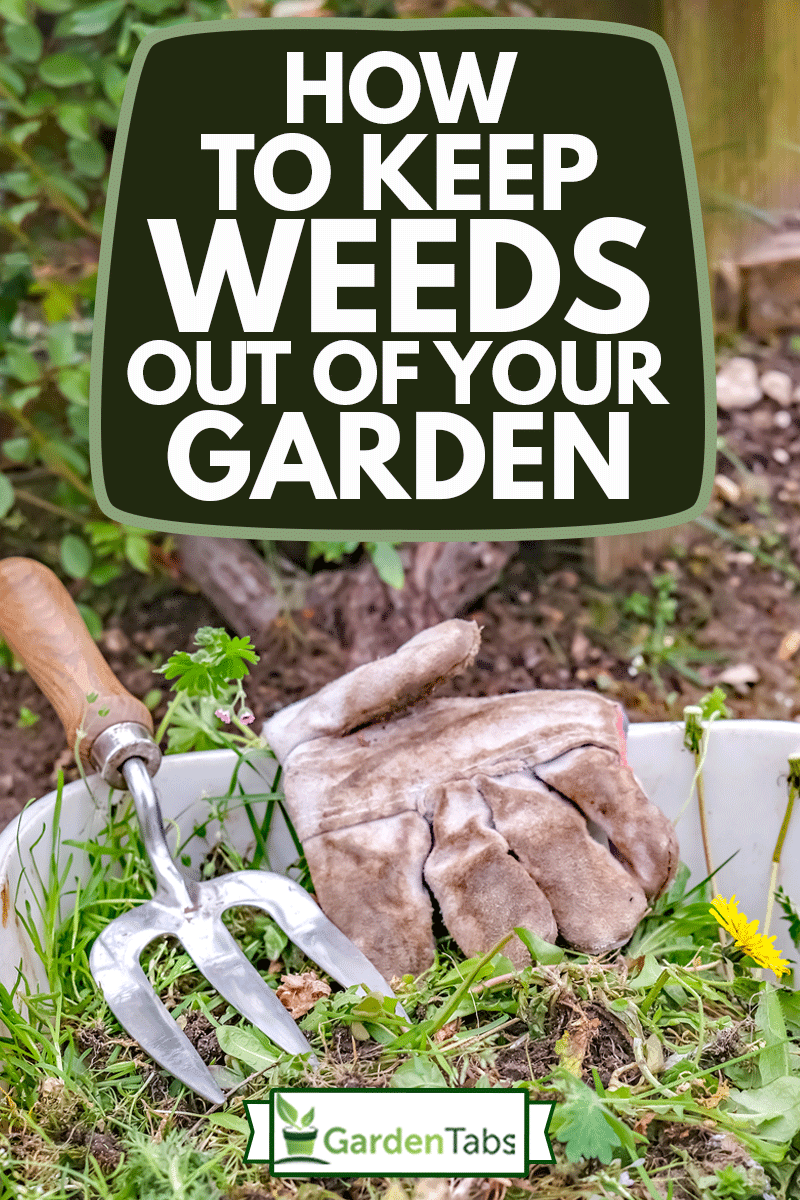
What Are Weeds?
A weed is any plant that you don't want growing in your garden and lawn. These plants can be invasive. However, what a weed is can change on a case-by-case basis. Amaranth, dandelion, and goldenrod are typical examples of plants that are considered to be weeds.
How To Prevent Weeds
Keeping weeds out of gardens can be difficult. Everyday activities such as digging and watering your yard can cause the weed's seed to germinate. Fortunately, there are still things that you can do to stop them from growing in the first place.
Don't Till or Disturb Your Soil
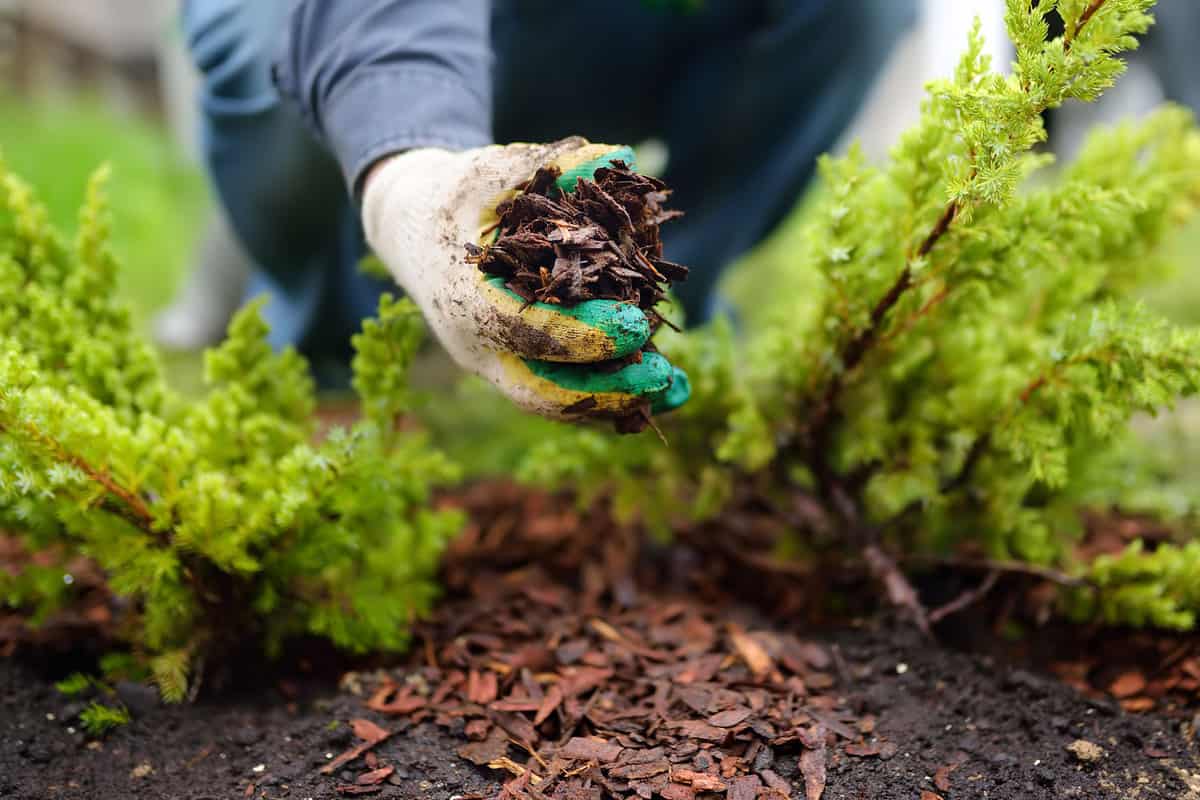
When you till your garden you increase your chance of getting weeds. Tilling can also help to get rid of weeds. However, just because you chop the weeds up doesn't mean that you've gotten rid of them.
This method frequently allows more weeds to grow because you didn't remove the entire root system. Disturbing the soil also provides an opportunity for previously dormant seeds to sprout.
You can also destroy the quality of your soil if you till too frequently or deeply. Typically, reserve tilling of soil for creating new gardens. It's a deep form of cultivation that adds organic matter to the soil. However, unless you're starting from scratch, you should avoid tilling your soil.
Cover Up Open Spaces
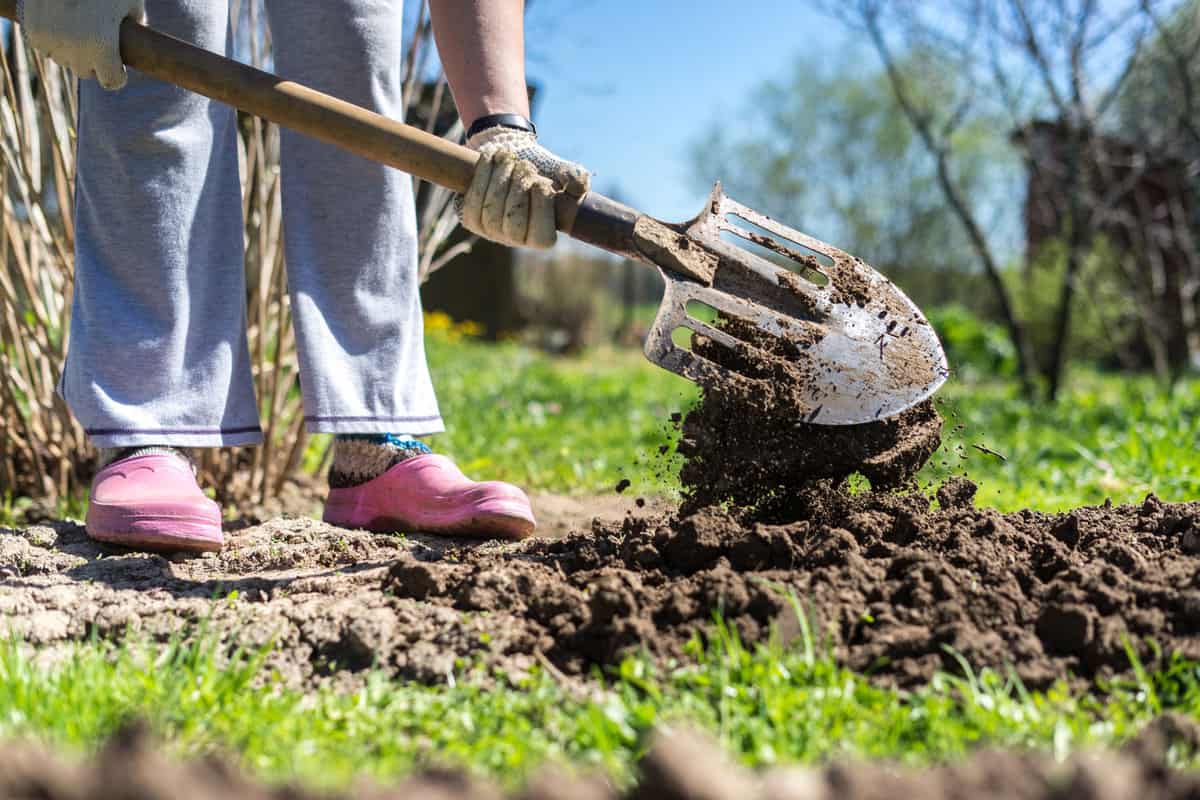
Weeds love unused areas in your garden. If you want to prevent them from growing, don't leave them any places to grow. Surround the area of your plants with a layer of mulch. Create a one- to two-inch layer for compost and other fine mulches. Create a two- to four-inch layer for loose and coarse-textured mulches, such as straw or shredded hardwood.
You can also use sheets of newspaper to cover the ground. To do this, take a few sheets of newspaper and spread them around your garden. Wetting the paper as you go will help them stick to the soil. This prevents weeds from growing and will nourish the soil as the newspaper breaks down. You can also add a layer of mulch on top.
Check out this video to see newspaper mulch in action!
Finally, landscape fabric or black plastic can be great for keeping weeds out of walkways. Make sure you secure these items to the ground if you use this method.
Click here for landscape fabric on Amazon.
Plant Cover Crops
Another way to utilize empty space is to plant cover crops. These plants are grown to cover the soil and not to be harvested. Typically plant these crops from mid-August until late September. Planting at this time gives them time to establish before the colder weather arrives.
Cover crops are utilized for several excellent reasons. They act as a fertilizer, improve soil quality, prevent soil erosion, manage weeds, and improve the soil's water management.
Some types of cover crops are toxic to some species of weeds. Rye (Secale cereale) and red clover (Trifolium pratense) are examples of plants that kill weeds in this manner.
Use Raised Beds or Containers
As you walk around your garden, you compress the soil. The more compacted your soil gets, the harder it will be for plants to grow unless it's a weed. If you switch to raised beds or containers, you don't have to worry about compacting your soil. Also, using mulch will greatly decrease the chances of weeds.
Check out this raised garden bed on Amazon.
Soak the Plant, Not the Soil
When watering your plants try watering at the base of each. Using this method helps water get to where your plant needs it, the roots. It also prevents you from accidentally watering nearby weed seeds.
Try using a watering can to help you localize how you water your plants. You can also use a watering hose and attachment. Make sure to use a low flow of water to avoid damaging any plants.
Check out this watering can on Amazon.
How To Get Rid of Weeds
Weeds can be tough to manage. Even with proper prevention, they can pop up. Here are a few tips for getting rid of weeds once they've already started to grow.
Use Gloves and Other Tools
Gardening gloves can make weed pulling easier because they improve your grip. This makes it easier to remove the entire weed without breaking the stem or missing roots.
Make sure you use a specific pair of gloves for pulling weeds. This can help you to avoid spreading more seeds around your garden.
Check out this 3-pack of gardening gloves on Amazon.
Tools like shovels and weed pullers can also make removing these determined plants easier. Sometimes removing the entire root system can be difficult. This is especially true if your soil has smashed down.
If it's too tough to pull the weed out, loosen the surrounding dirt with a small shovel or consider a weed puller. These pronged devices are used by first spearing the weed with the prongs. When you tilt the handle, it will pull the weed out of the ground.
Check out this weed puller tool on Amazon.
Check out this gardening tool set on Amazon.
Use a Proper Grip
If you grab a weed from the top, you can potentially break it as you pull it out. It's essential to pull out as much of the root system as you can. If you leave too much of the root system behind, the weed will still grow new shoots.
When you pull your weeds, make sure you grab them close to the ground at the plant's base. Then, use a firm grip and pull up. If you have trouble pulling it out, you can water the weed to make it easier.
Use Boiling Water
Using boiling water is an easy and natural method to kill weeds. This method is easy, nearly free, and can permanently kill these plants right to the root.
To use this method, first, you'll bring water to a boil. Once that's done, take the water and pour it directly onto the weed. You can saturate the entire area. However, a localized pour near the base of the plant is the most effective.
This method is best used with weeds more on their own. Boiling water can damage other plants and grass, not just your weeds.
How do I keep weeds out of my garden naturally?
Aside from boiling water, there are several great ways to keep weeds out of your garden naturally. The best thing you can do is prevent them from growing in the first place.
Keeping unused soil covered by mulch, practicing good watering, and pulling weeds when they're small are great ways to keep weeds out of your garden.
You can also make a natural weed killer with one gallon of white vinegar, one cup salt, and one tablespoon of liquid dish soap. Combine the ingredients and transfer them to a spray bottle. Spray this concoction on your weeds and let it get to work.
The vinegar and salt act to absorb moisture from the weeds. It will also remove water from the surrounding area. So, while natural, you should still be careful when using this mixture. Overuse can damage the soil.
How do you clean a full weeds garden?
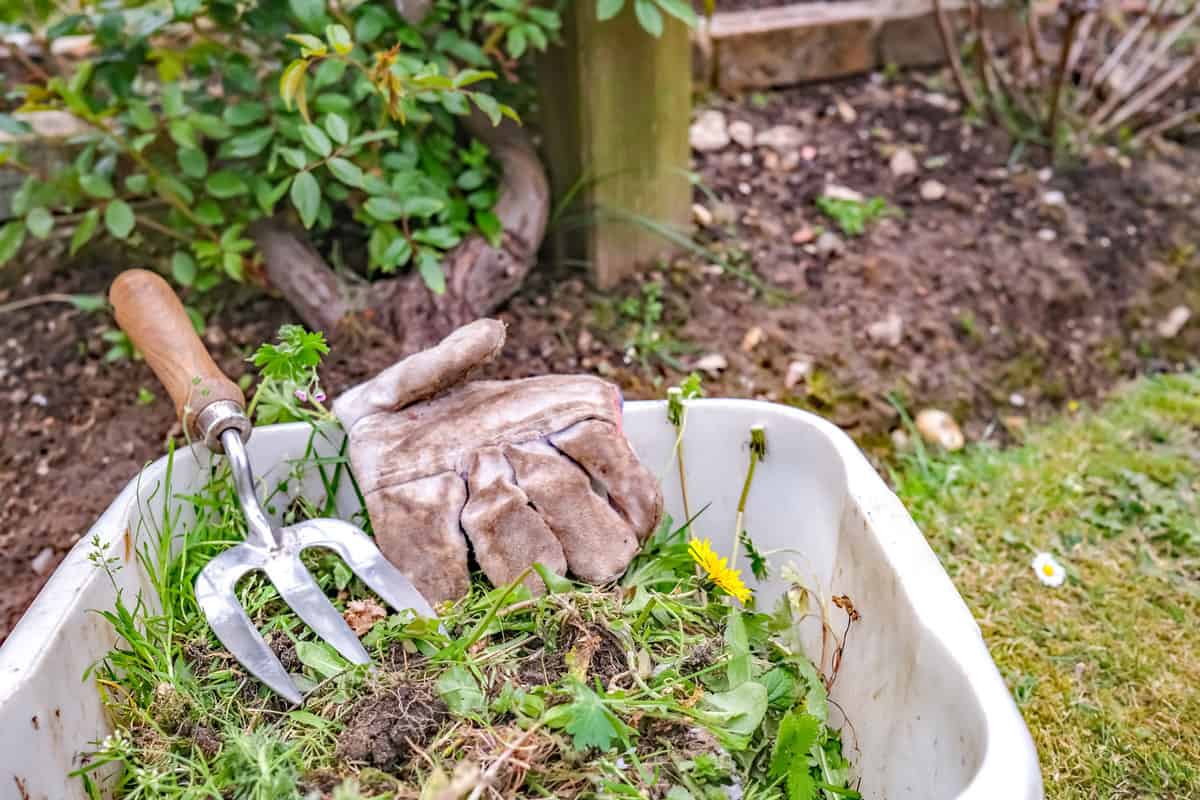
A garden overflowing with weeds can sound like an overwhelming task. If pulling weeds and using preventative measures doesn't help you, you may need to start over or use more serious methods.
Using a weed cutter can help you to trim back weeds. From there, you can either till the ground, or you can use a weed gas burner. This tool burns the weeds away. While this method is effective, using fire to control weeds can be dangerous and damage surrounding plants.
Check out this self-igniting gas weed killer on Amazon.
How do you permanently stop weeds from growing?
Unfortunately, weeds are tough plants, and it's hard to prevent them from growing altogether. The best ways to ensure you don't get them are to cover open spaces, avoid disturbing the soil, and pull as you find them.
Is it OK to use RoundUp on a vegetable garden?
It is possible to use RoundUp in your vegetable garden if you're careful. If you use RoundUp, it's best to wait a minimum of 72 hours before planting vegetables.
The glyphosate in the product should break down fairly quickly and shouldn't spread in the soil. While 72 hours should be safe, it's best to read the instructions that came with your product.
How do you get rid of weeds in rock landscaping?
The two most effective ways for removing weeds from rock landscaping are pulling them by hand or burning the weeds. While salt can be effective for regular landscaping, you should avoid it here. Salt can get washed away easier in rock landscaping and cause damage in unintended areas.
Check out "22 Ideas For Landscaping With Moss Rocks" for great rock design ideas!
Will salt prevent weeds from growing?
Salt acts as a natural weed killer because it absorbs water from the surrounding area. To use salt for weed management, it's best to sprinkle it directly around the plant. Too much salt will also disturb other plants.
In Closing
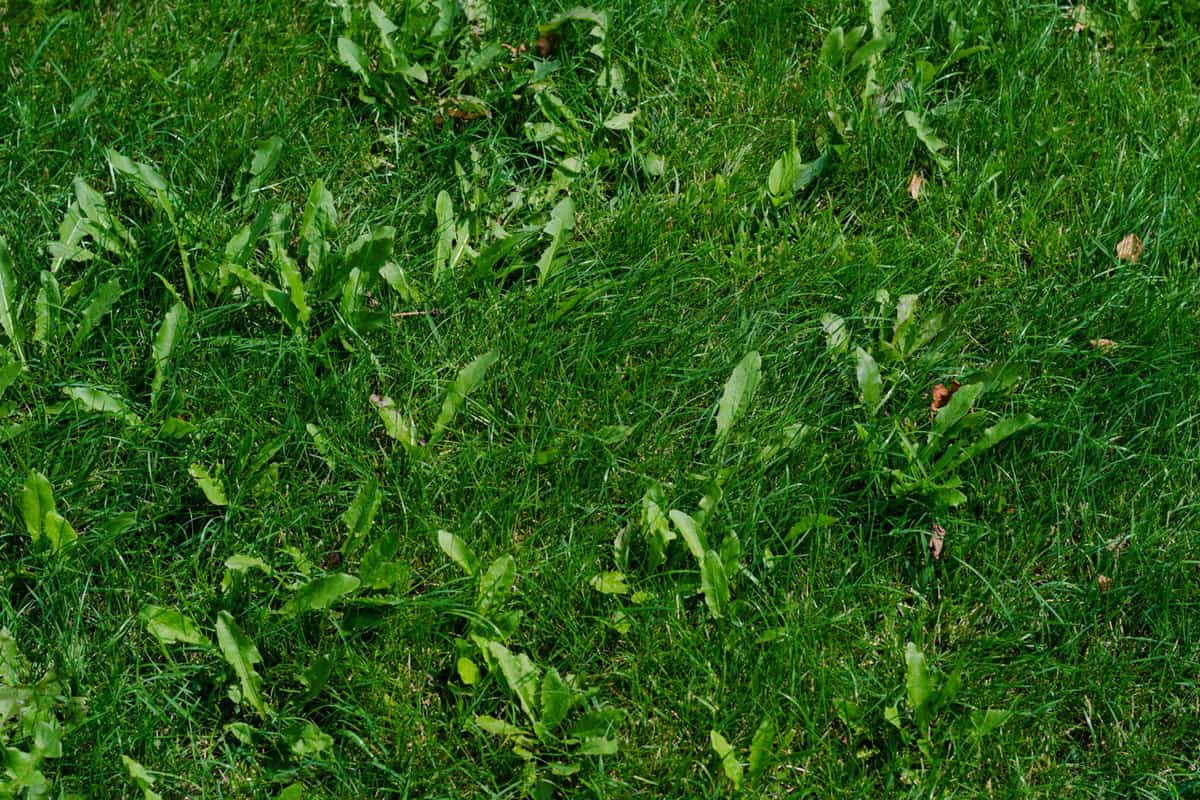
Weeds are a persistent plant, but you can manage them! Make sure you pull weeds as you see them, use mulch or cover crops, and consider switching to raised beds to make handling weeds easier for you!
You may also enjoy:







